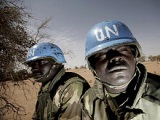International Peacekeeping Operations in Africa - A Troubled or Evolving Landscape?
20 Nov 2012
The ISN’s parent organization, the Center for Security Studies (CSS), will be hosting a two-day conference this week on International Peacekeeping in Africa: Actors and Missions. This event will bring together a number of high-profile academics and practitioners to discuss the past, current and future state of peace operations (POs) in Africa. As part of this broader meeting, on Friday evening the ISN will be hosting a panel discussion on POs with three distinguished experts in the field.
Setting the Scene
Africa has not only witnessed a dramatic increase in peace operations since the early 1990s, it has also seen an increase in the number of actors and organizations involved in them. As a result, POs have become increasingly complex and diverse in terms of their composition, missions and mandates. They have also played themselves out against the backdrop of a new “scramble” for Africa by resource-hungry states. Because of these developments, the PO model largely used in the 1990s (multiple large-scale deployments) no longer reflects current realities.
Alongside keeping the peace, POs are now expected to do other things – i.e., linking themselves to the principles of the Responsibility to Protect (R2P); contributing to Security Sector Reform (SSR); performing local capacity building; supporting political dialogue and reconciliation; consolidating regional military cooperation, and much more.
This proliferation of PO roles is both noteworthy and a matter of concern, but it also points to a core question – who should perform these various activities? Should it be ‘heavy-footed’ outside actors or should Africans increasingly assume ownership of this critical activity, primarily through the African Union or sub-regional organizations such as ECOWAS, SADC, and IGAD? This ‘Africanization’ of POs may indeed point to a new era of more nimble and responsive peace operations, but making this transition, along with the diversifying of PO activities, remains problematic.
In order to explore the above issues and more, we at the ISN are delighted to host a panel discussion on them this Friday (23 November) in Zurich. Entitled “International Peacekeeping in Africa – A Troubled or Evolving Landscape?”, the panel will feature the following distinguished speakers.
Our Guest Speakers
Mr. Alan Doss had a long and distinguished career with the United Nations, where he performed high visibility peacekeeping, development and humanitarian assignments in Africa, Asia and Europe, as well as at United Nations Headquarters in New York.
More specifically, Mr. Doss served as the Special Representative of the Secretary-General of the United Nations in the Democratic Republic of the Congo and Head of the UN peace keeping mission (MONUC); as Special Representative of the UN Secretary-General in Liberia and head of the UN mission (UNMIL); as Principal Deputy Special Representative of the Secretary-General for Côte d’Ivoire and deputy head of the United Nations Mission (ONUCI); and as Deputy UN Special Representative in Sierra Leone and deputy head of the UN Mission (UNAMSIL), while also serving concurrently as United Nations Humanitarian Coordinator and United Nations Development Programme (UNDP) Resident Representative. Prior to the above assignments, Mr. Doss additionally served as Director of the United Nations Development Group (UNDG), Director of the UNDP European Office in Geneva, Switzerland, and other noteworthy positions.
Mr Doss has written numerous articles on development, peace keeping and peace building. He delivered the 2009 Nelson Mandela Lecture on Africa at the Royal United Services Institute in London and the 2010 Count Folke Bernadotte Memorial Lecture on Protection and Peacekeeping at the United Nations Association of the United Kingdom.
Dr. Jide Martyns Okeke is a Senior Researcher on the African Peace and Security Architecture at the Institute for Security Studies (ISS), Addis Ababa, Ethiopia. He holds a PhD in Politics and International Studies from the University of Leeds, with a specific focus on the Responsibility to Protect. His most recent publications include: “The Election of Dr. Noksazana Dlamini Zuma as AUC Chairperson: towards Pan-Africanism and African Renaissance,” ISS Policy Brief (July, 2012); “Why Humanitarian Assistance in Darfur is not a Practice of Responsibility to Protect,” Nordik Afrika Institute Discussion Paper (2011); and “Contextualizing the Responsibility to Protect in the Darfur crisis,” International Journal of African Renaissance Studies (2010).
Dr. Paul D. Williamsis an Associate Professor at the Elliott School of International Affairs, George Washington University, Washington, D.C. He also serves as a Non-resident Senior Adviser at the International Peace Institute in New York City and a Visiting Professor at the Institute for Peace and Security Studies in Addis Ababa, Ethiopia. His books include War and Conflict in Africa (Polity, 2011), Understanding Peacekeeping (Polity, 2nd ed. 2010), and The International Politics of Mass Atrocities: The Case of Darfur (Routledge, 2010).
Again, “International Peacekeeping in Africa – A Troubled or Evolving Landscape?” will be held on Friday, 23 November 2012 between 18:00 and 19:30pm. More information on the roundtable discussion can be accessed here.

